
Discover The Moon Phase During Lunar Eclipse
Discover the specific moon phase when lunar eclipses occur and their significance in the celestial ballet.
article by Priya Deshmukh
The Celestial Phenomenon of Lunar Eclipses
Lunar eclipses are among the most dramatic and visually striking events in the night sky, captivating observers for centuries. These occurrences are not random but happen during a specific phase of the moon. In contrast to solar eclipses, which can only occur during a new moon, a lunar eclipse invariably happens at a full moon. This is the only time when the Earth can come between the sun and the moon, creating the perfect alignment necessary for an eclipse to take place. Despite their association with astrology and mysticism, lunar eclipses are predictable astronomical events, with their schedule calculated years in advance. The shadow of the Earth, which falls on the moon during these events, has intrigued many cultures, which often embedded eclipses within their folklore and prognostications.

The Role of the Full Moon Phase
Lunar eclipses are exclusive to the full moon phase when the sun fully illuminates the moon’s surface as seen from Earth. This phase symbolizes completion and fulfillment in astrological terms. It’s a time when emotions and tensions can be heightened, and during an eclipse, these feelings may be even more pronounced. According to astrology, a lunar eclipse can act as a catalyst for change, signaling times of transformation and renewal. Eclipses can bring about the abrupt end to certain life chapters, urging us to move forward. For those interested in astrological forecasts, paying close attention to the lunar eclipse schedules of 2024 can offer insights into potential personal and collective shifts.

The Types of Lunar Eclipses
Not all lunar eclipses are alike. There are three types: total, partial, and penumbral. A total lunar eclipse occurs when the entire moon passes through Earth's umbral shadow and can take on a dramatic reddish hue, earning the moniker 'Blood Moon.' Partial lunar eclipses happen when only a part of the moon enters Earth's umbra, and penumbral eclipses are the most subtle, with the moon only traversing the lighter penumbral shadow of the Earth. Each type offers a different aesthetic and astrological significance, suggesting varying degrees of impact on personal and global horoscopes.

Future Lunar Eclipses to Watch
For astrology aficionados and casual observers alike, upcoming lunar eclipses present an opportunity to witness this celestial interplay. In the years following 2024, notable lunar eclipses will grace our skies, each with its unique astrological implications. Eclipses generally occur in cycles, known as 'eclipse seasons,' which take place roughly every six months. Keeping an eye on these cosmic events can be both a visual treat and a moment for reflection, as eclipses are often thought to unveil truths and accelerate evolutionary growth in astrology.

Lunar Eclipses in Astrological Practice
In an astrological context, lunar eclipses are considered pivotal events that can highlight areas of life that require attention or transformation. They can bring hidden information to the surface and instigate major personal developments. Horoscope readings during eclipse periods often focus on the houses and signs that the eclipses activate in an individual’s natal chart. Astrologers encourage paying particular attention to the areas of life these houses govern as they may experience the most significant shifts during a lunar eclipse.
Eclipses and Biorhythms
In the sphere of biorhythms, which posits that life is influenced by natural mathematical cycles, lunar eclipses can be seen as disruptors or reset points. Some advocates of biorhythm theory suggest that the emotional, intellectual, and physical cycles of individuals might be affected during these times. As a result, adherents might adjust their expectations or habits accordingly, seeking to align with the rhythm of the lunar cycle, especially during the intense energy of an eclipse. While biorhythms are not scientifically substantiated, they remain an interesting concept within holistic and New Age circles.
Published: 1/19/2024
Modified: 1/19/2024
More predictions
Come back here soon to learn more about yourself and your future


Moon Phases: Celestial Dynamics and Impact
Discover the intriguing facts about moon phases and their significance in celestial dynamics, astrology, and personal biorhythms.


The Reality of Moon Phase Soulmates
Delve into the mystical concept of moon phase soulmates and discover if there's truth behind the celestial connection.